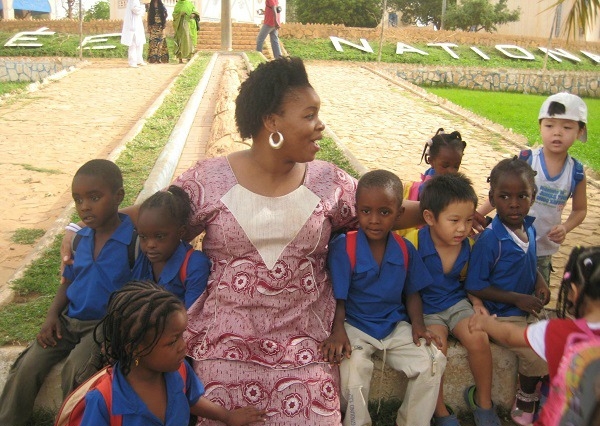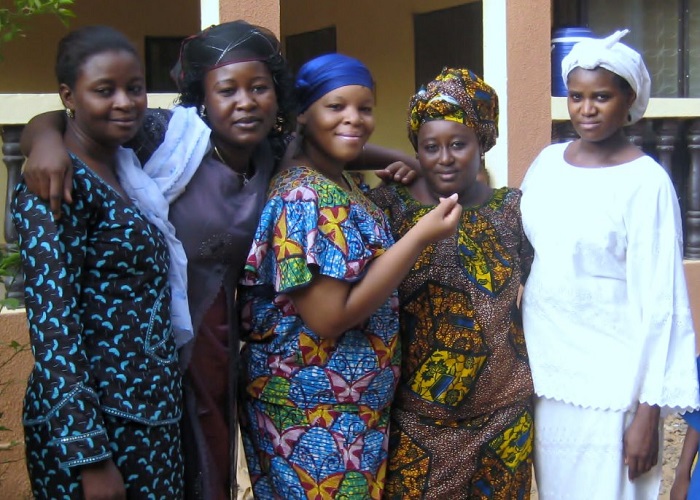Beyond The Stereotypes: African American Falls In Love With Niger Life
Tecie with her 2013-2014 kindergarten class in Niger.
Originally from Tampa, Florida, Tecie first visited Niger in 2008 on a short-term mission trip. Three visits later, a professional opportunity brought her to live in Niamey, the country’s capital city. She shared enlightening perspectives from her experience living in Nigerien society and what her almost two years living there has taught her.
ABOUT YOU
How did you end up in living in Niamey, Niger and what you are you doing there professionally?
I first came to Niger with my church on a short-term mission trip. The trip was assembled by Dr. Amina Alio, a Nigerian American. Professionally, I’m a volunteer kindergarten teacher and I also teach private English lessons.
How long have you been living in Niger and how long do you plan to stay?
I’ve been living in Niger since August 2012. This is my fourth visit. My contract will finish at the end of the Nigerien school year this June and I’m currently searching for other opportunities abroad.
Is this the first African nation that you've visited?
Yes.
What’s it like teaching at a Nigerien school?
Teaching in a Nigerien school is rewarding. My students are very happy to have me because my methods are different from most Nigerien teachers. My students make me feel like a celebrity and they are fascinated by me. I love teaching my students.
Can you describe your experience immigration wise, of moving to Niger? What advice can you give potential expats?
My experience immigration wise was fairly easy. I came to Niger on a regular visa. To receive a regular visa you need proof of a round trip airplane ticket and at least $500 in your checking account (this is to prove you have money to support yourself while here). The only other requirement is a yellow fever immunization. There are others immunizations that are recommended but not required.
My recommendation to anyone who wants to visit Africa is to either come with an organization or to know someone here before you come. This will give you a more realistic and interesting visit.
EVERYDAY LIFE
What’s life like in Niger?
My short response is it’s challenging. It’s not for people who want familiarity or acceptance. Niger on paper is one of the poorest (undeveloped) and hottest countries in the world. It is a third world country and it is rural. At least 96 percent of the population is Muslim and very traditional.
Let me state that the rest of what I am about to say is my personal opinion. The role of women in this society is to get married, bear children, be completely submissive to their husband, and take care of the home. It would be very uncommon to see a group of women in a restaurant or out having a cup of coffee together. You may see them in the market shopping for the home or selling in the market, but not out socially with friends. The entertainment for women is weddings, baby naming ceremonies, and church, if you are Christian. Other than that as women your main role is in the home.
Women here dress very conservatively, wearing only dresses and skirts. They cover all body parts: arms, legs, chest, back, and the majority their heads. The men have more freedom socially and are the life of Niger; women and men are definitely set apart.
The reason I answered the question this way is to give some insight into what it is like here. If you are not raised in a similar culture I’m sure you will have difficulties settling in. You can try to bring western ways here but they are not accepted or appreciated. They have their culture and this is what the majority know. If you are different it’s normally not accepted, unless those differences are related to this culture.
What do you love the most about living in Niger?
I love it’s simplicity and that it’s as natural as natural can get LOL. It definitely has an old, small town feel. You can’t walk three feet without seeing an animal of some sort. I also love how it’s an outdoor society. People are not normally indoors. They’re normally outside talking, walking, praying, or working. There is a lot of beauty in Niger and a lot to be learned if you are not stuck in your ways. You also have to take care of each and every relationship here because someone always knows someone who knows someone—so pay attention to how you treat people or it could come back to bite you.
Tecie spending time with work colleagues.
What were the easiest things to adjust to?
The easiest thing to adjust to was the people as odd as that may sound! Nigeriens are generally friendly people and they are peaceful as long as you follow the order. When people see you they know you are different and are interested in learning about you.
What were the most difficult things to adjust to?
The most difficult thing to adjust to was that fact that as a foreigner, things are different for me. Foreigners are perceived as having money since they were able to travel to Niger—therefore everything will be more expensive for you. People will be friendly but not on a personal level; they set foreigners apart in activities and meals.
Another difficult thing to adjust to is the culture. Due to my American upbringing, there are certain behaviors I’m not used to such as being ordered to do something. If the person giving you an order is older or a man you have to show respect by obeying. If I’m wearing pants, which I wear to do sports, women stare disapprovingly at me.
I don’t think many Nigeriens are aware of other cultures, therefore it may be difficult for them to accept people who are not like them. You have to try to blend in or it will be very difficult for you. If you don’t try to fit in with the standards here, people won’t accept you. They won’t welcome you and be kind to you or sometimes, even acknowledge you.
The U.S. State Department warns Americans of several risks of living in Niger. How has your experience compared? What safety concerns have you faced, if any?
I truly don’t know of the risk America warns of, but I don’t follow those warnings. I live in Niger and my experience has always been peaceful. I haven’t faced any risk or safety concerns. I use common sense. If I’m going to a place where I know there will be a lot of people, I dress appropriately like the natives would so I don’t stand out so much, and if something doesn’t feel right I don’t do it! You can’t live your life in fear and once you come to know the people of Niger you will realize there is nothing to fear. It’s not Nigeriens who make this country unsafe or are involved in terrorist attacks. It’s normally people who are not from here, who enter through the desert, and sneak away in the night. Nigeriens are very peaceful.
What is your social life like in Niger?
To be honest, I don’t have much of a social life here. My social life consists of meeting with a group of American women once a week over dinner and going to church. Like I mentioned earlier, women here don’t go out socially unless they are escorted by their husband. Their roles are in the home. If I do anything socially it’s normally with foreigners like the French, Americans, or Ghanaians.
Tecie, attending a traditional Toureq concert with her friend, Fatama.
Can you share a few details on the cost of living in Niger?
The cost of living in Niger depends on your preference. If you want to live the way you do in America you will pay. I live with the organization I moved here with, so I don’t pay bills. I think you can find a decent house for $400 a month. I’m not sure of the cost of amenities, but I do not have AC or hot running water. If you have these amenities your bills would be more.
It’s also not recommended for women to live alone. Women who live alone are known to be prostitutes. You don’t leave your mother’s house until you are married.
If you want to eat American style (butter, cheese, milk, cereal, bread, sandwich meat) you will spend a lot because these foods are imported, as normal Nigeriens do not eat these foods. Local meats, fruits, vegetables, and grains can be found in the markets and you can negotiate the price on everything. Normally items are brought by kilogram (which is a little bit over two pounds).
FINAL REFLECTIONS
What’s your best advice for someone who wants to move to Africa?
My advice would be to GO FOR IT. You don’t have anything to lose and you have everything to gain. Living in Africa can give you identity and purpose. There is so much to learn and so much to give. Most Africans are happy to receive African Americans, and it does bring peace and renewal.
Do you think enough African Americans visit Africa?
From my personal experience not enough African Americans visit Africa, but a lot of our Europeans brothers and sisters do.
Are you ready to head back to the States? What would be your ideal next step?
I’m not ready to head back home but I am going home early this summer. It’s time to hit the books so I can broaden my life experience. Life can only give you what you are qualified to receive so it’s time for me to go back to the drawing board. It’s all about learning and when you stop learning you stop living.
What have you learned about yourself during your time in Niger?
Oh, I have learned so much about myself… where do I begin!
I first learned that American culture isn’t the only culture in the world and that we have so much to learn from other cultures.
I learned that you have to respect people for who and where they are in life.
People cannot be who you want them to be; we are only people and our experiences and upbringing makes us who we are.
You can’t live your life according to other people standards. You have to be yourself and work at being the best you, regardless of your current situation.
Live your life doing and giving your best. Let go and let God do the rest. Stay blessed!
Is there anything else you’d like to add?
Don’t be afraid! Make friends with the Africans in your U.S. hometown, talk about your interest in Africa and your desire to visit. They should be more than happy to share what they can with you and to give you insight.
Where can we follow your experience?
You can follow my experience on Facebook. My username is Tecie Cut. I’m always commenting and sharing pictures of my class and experiences.





